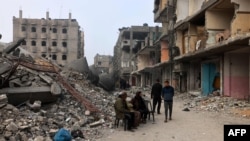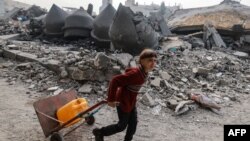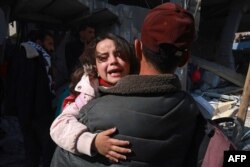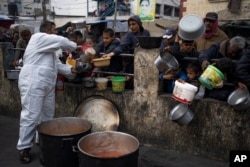Israel's war cabinet agreed Saturday to send negotiators to Qatar to continue talks toward a cease-fire and the return of about 130 hostages held in Gaza, officials and local media said.
The Israeli delegates returned Saturday from the peace talks in Paris where they met on Friday with Qatari, Egyptian and U.S. mediators who had helped put together the November cease-fire during which scores of Hamas' captives were freed in return for the release of Palestinian prisoners.
The war cabinet met on Saturday to hear an update on the negotiations, national security adviser Tzachi Hanegbi said.
"There is probably room to move towards an agreement," Hanegbi told N12 News television in an interview, without elaborating, AFP reported.
Israel wants the release of all of the hostages taken in the October 7 attacks, starting with the women, but Hanegbi added: "Such agreement does not mean the end of the war."
He also indicated that Israel would not accept any deal between the United States and Saudi Arabia for a Palestinian state.
Media reports indicated Palestinian representatives who have seen the plan have rejected it. Parts of the plan also run counter to what Washington has envisioned for the region, which is a two-state solution involving an independent Palestinian state.
Thousands of people held a vigil for the hostages on Saturday in Tel Aviv, a short distance from an anti-government protest where police reported five arrests for disorderly conduct.
Hamas has previously said that it will free the remaining 130 hostages if Israel releases thousands of jailed Palestinians and calls off the Gaza offensive, which medical officials in the enclave say has killed nearly 30,000 people.
The Israeli military said Saturday the death of an infantry major in combat brings its military losses in the Gaza fighting to 239. Israel says it has killed about 12,000 Hamas fighters, effectively halving the faction's Gaza garrisons.
Hamas says those figures as overblown.
Israeli Prime Minister Benjamin Netanyahu said in a statement that Saturday's war cabinet meeting would address "next steps in the negotiations" and reaffirmed his intention of sending troops into Rafah in southern Gaza, despite widespread concern about the impact of an Israeli attack on the hundreds of thousands of civilians who have fled there to avoid bombardments.
Washington has urged its ally not to attack Rafah, warning that such an offensive will cause vast civilian casualties.
At least six airstrikes targeted the city Saturday evening according to an AFP reporter in Rafah.
Israeli forces have launched more than 70 strikes since Friday on locations in Gaza, including Deir al-Balah, Khan Younis and Rafah. The Hamas-run health ministry in Gaza said Saturday at least 92 people were killed in the strikes in the last 24 hours. Some 69,737 people have been injured since the conflict began on October 7, according to a statement.
This week, the World Food Program said its teams reported "unprecedented levels of desperation," while the United Nations warned that 2.2 million people were on the brink of famine.
On Friday, the health ministry in Hamas-run Gaza said a 2-month-old baby died of malnutrition outside the city of Jabalia in northern Gaza.
The United Nations children's agency, UNICEF, has warned that the alarming lack of food and surging malnutrition and disease could lead to an explosion in child deaths in Gaza.
On February 19, UNICEF estimated that one in six children younger than two in Gaza was acutely malnourished.
Some information for this report came from The Associated Press, Agence France- Presse and Reuters.









